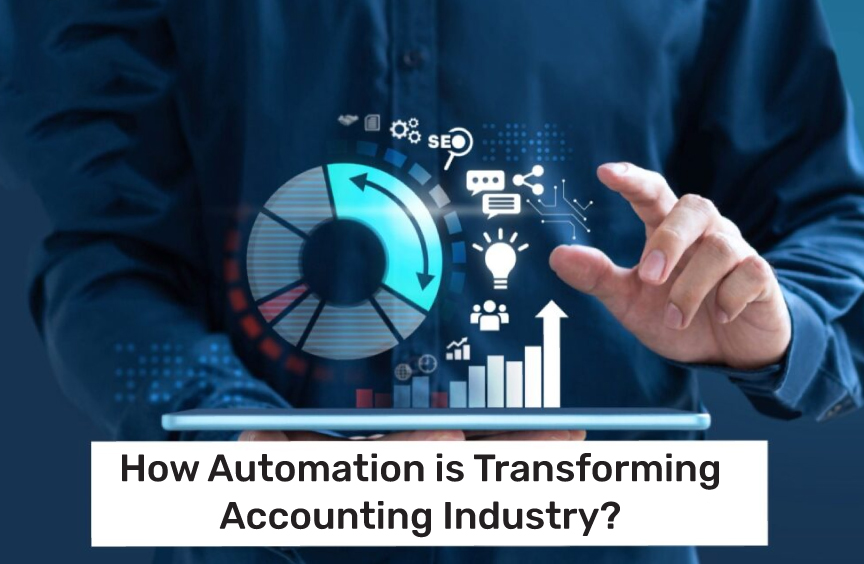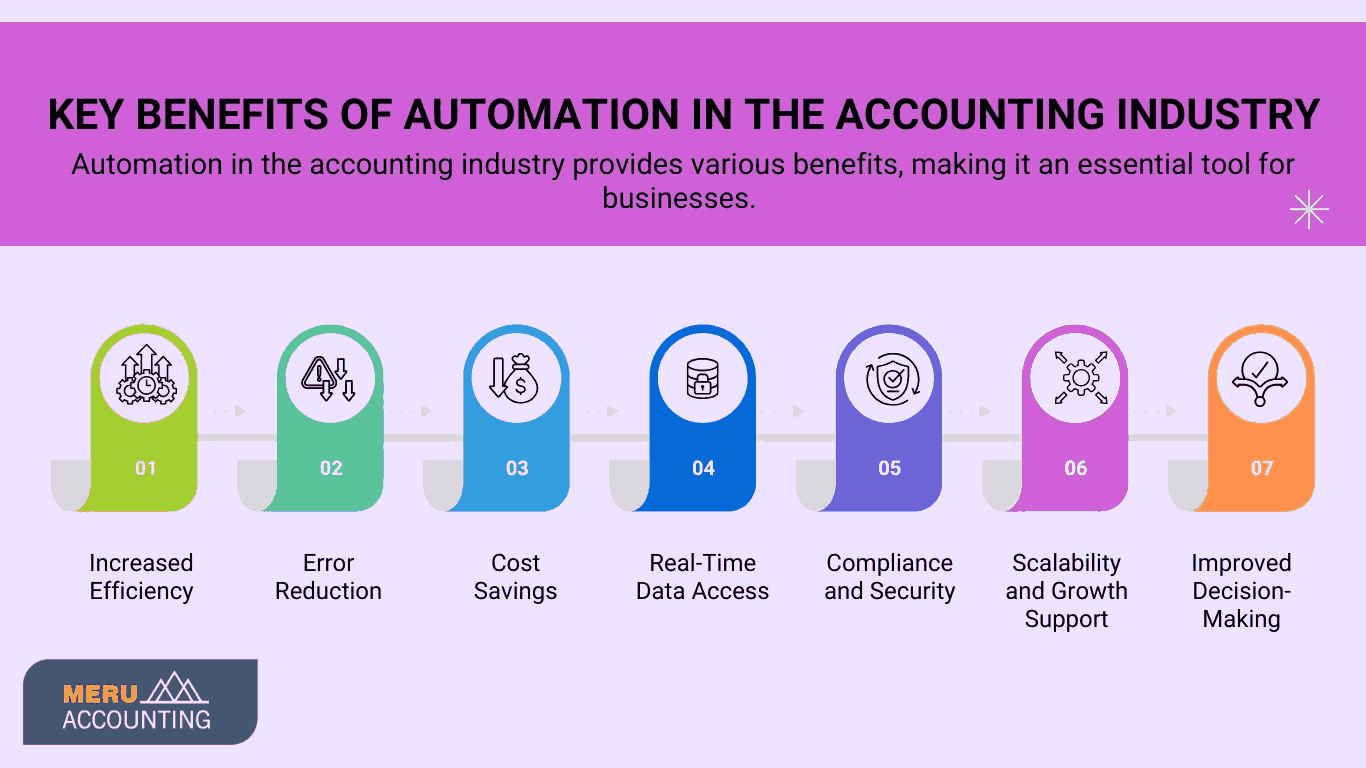Table of Contents
- 1 The Rise of Automation in Accounting
- 2 What Is Accounting Automation?
- 3 Key Benefits of Automation in the Accounting Industry
- 3.1 1. Increased Efficiency
- 3.2 2. Error Reduction
- 3.3 3. Cost Savings
- 3.4 4. Real-Time Data Access
- 3.5 5. Compliance and Security
- 3.6 6. Scalability and Growth Support
- 3.7 7. Improved Decision-Making
- 4 Challenges and Considerations in Accounting Automation
- 4.1 1. Initial Implementation Costs
- 4.2 2. Security Risks
- 4.3 3. Adaptation by Employees
- 4.4 4. Integration with Existing Systems
- 5 How Accounts Junction Utilizes Automation for Better Results?
- 5.1 1. Cloud-Based Accounting Solutions
- 5.2 2. Automated Invoice Processing
- 5.3 3. Expense Management
- 5.4 4. Payroll and Tax Compliance
- 5.5 5. Custom Automation Solutions
- 5.5.1 Conclusion
- 5.5.2 FAQs

How Automation is Transforming Accounting Industry?
The Rise of Automation in Accounting
Automation in the accounting industry has changed how businesses handle their financial operations. With advanced technology, businesses no longer need to depend solely on manual accounting processes. Accounting automation helps companies save time, reduce errors, and streamline their financial workflows. As more businesses adopt accounting and automation technologies, the accounting industry is experiencing a major transformation.
The adoption of automation in the accounting industry is driven by advancements in artificial intelligence (AI), machine learning, robotic process automation (RPA), and cloud-based solutions. These technologies enable businesses to eliminate tedious manual work, allowing accountants to focus on strategic financial planning and analysis. Accounting automation is becoming more accessible, even for small businesses.
What Is Accounting Automation?
Accounting automation refers to the use of technology, such as artificial intelligence (AI), machine learning, and cloud-based software, to perform financial tasks automatically. It eliminates the need for manual data entry, allowing accountants and finance teams to focus on strategic decision-making rather than repetitive tasks.
- Automated invoicing and billing: Businesses can automatically generate and send invoices, reducing delays and improving cash flow management.
- Bank reconciliation: Automated tools match bank transactions with accounting records, minimizing discrepancies and ensuring accuracy.
- Expense management: AI-driven solutions categorize expenses, track receipts, and generate reports in real-time.
- Tax calculations and compliance tracking: Automation helps businesses stay compliant with tax regulations by calculating liabilities and preparing necessary reports.
- Payroll processing: Automated payroll systems ensure accurate salary calculations, tax deductions, and direct deposits for employees.
With the increasing use of accounting and automation together, businesses can improve accuracy and efficiency while reducing costs. Modern accounting automation solutions integrate seamlessly with existing financial software, providing real-time insights into a company’s financial health.
Key Benefits of Automation in the Accounting Industry
Automation in the accounting industry provides various benefits, making it an essential tool for businesses.
1. Increased Efficiency
With accounting automation, repetitive tasks such as data entry, transaction matching, and report generation are completed faster. This allows accountants to focus on value-added tasks such as financial analysis, forecasting, and strategy development.
2. Error Reduction
Manual accounting processes are prone to errors, which can lead to financial discrepancies and compliance issues. Accounting and automation reduce the chances of miscalculations, duplicate entries, and incorrect tax filings, ensuring more accurate financial records.
3. Cost Savings
Businesses save money by reducing labor costs and eliminating inefficiencies. The use of automation in accounting industry tools minimizes the need for large accounting teams, allowing companies to allocate resources more effectively.
4. Real-Time Data Access
With cloud-based accounting automation software, financial data can be accessed in real-time from anywhere. This improves decision-making and helps businesses stay financially informed.
5. Compliance and Security
Accounting and automation solutions ensure tax compliance and regulatory adherence. Automated systems track changes in tax laws, generate accurate reports, and reduce the risk of non-compliance penalties. Additionally, advanced encryption and cybersecurity measures protect sensitive financial data from fraud and breaches.
6. Scalability and Growth Support
As businesses grow, their accounting needs become more complex. Automation in the accounting industry allows companies to scale operations without significantly increasing costs or workload.
7. Improved Decision-Making
Automated accounting systems provide accurate and up-to-date financial insights, enabling business owners and financial managers to make informed decisions. Predictive analytics powered by AI can forecast cash flow trends, helping businesses plan for future financial needs.
Challenges and Considerations in Accounting Automation
While automation in the accounting industry offers many benefits, businesses must consider some challenges before implementation.
1. Initial Implementation Costs
Setting up accounting automation tools requires investment in software, infrastructure, and employee training. However, the long-term benefits far outweigh the initial costs, as automation significantly reduces operational expenses over time.
2. Security Risks
Financial data security is a major concern. Businesses using accounting and automation must ensure their software has strong encryption and cybersecurity measures. It is essential to choose reputable software providers with robust security protocols.
3. Adaptation by Employees
Employees may resist transitioning to accounting automation due to a lack of familiarity with new technology. Proper training, user-friendly interfaces, and ongoing support can help ease the transition and improve adoption rates.
4. Integration with Existing Systems
Businesses must carefully select tools that are compatible with their current accounting and enterprise resource planning (ERP) systems to avoid workflow disruptions.
How Accounts Junction Utilizes Automation for Better Results?
Accounts Junction has successfully integrated accounting automation to provide efficient services to clients.
1. Cloud-Based Accounting Solutions
Accounts Junction uses cloud-based platforms such as QuickBooks, Xero, and Zoho Books for seamless automation of accounting industry processes. These tools allow businesses to manage their finances remotely and access real-time reports.
2. Automated Invoice Processing
By utilizing AI-driven accounting and automation, Accounts Junction automates invoicing, reducing errors and improving cash flow management. Clients receive timely reminders for outstanding payments, ensuring better financial stability.
3. Expense Management
With accounting automation, clients can track expenses in real-time, categorize transactions, and generate reports effortlessly. This helps businesses optimize their spending and maintain better financial control.
4. Payroll and Tax Compliance
Accounts Junction ensures accurate payroll processing and tax compliance by utilizing automation in accounting industry tools, reducing the risk of penalties. Automated tax calculations and filings streamline compliance with local and international regulations.
5. Custom Automation Solutions
The firm provides customized accounting and automation solutions tailored to meet the specific needs of different industries, ensuring optimal financial management. Whether for small businesses or large enterprises, Accounts Junction designs automation strategies that align with business objectives.
Conclusion
Automation in the accounting industry is reshaping financial management. By adopting accounting automation, businesses can enhance efficiency, accuracy, and compliance while reducing costs. Accounts Junction utilizes advanced automation techniques to deliver customized financial services.
FAQs
1. What is accounting automation?
Ans: Accounting automation refers to the use of technology to automate financial processes such as invoicing, payroll, bank reconciliation, and tax calculations.
2. How does automation in the accounting industry benefit businesses?
Ans: Businesses benefit from automation in the accounting industry through increased efficiency, reduced errors, cost savings, real-time data access, and improved compliance.
3. Is accounting and automation suitable for small businesses?
Ans: Yes, small businesses can greatly benefit from accounting and automation as it helps save time, reduce costs, and maintain accurate financial records.
4. Can accounting automation replace accountants?
Ans: No, accounting automation enhances accountants' efficiency by automating repetitive tasks, allowing them to focus on strategic financial planning.
5. What are the best automation in accounting industry tools?
Ans: Popular automation in accounting industry tools include QuickBooks, Xero, Zoho Books, FreshBooks, and Wave Accounting.
6. How does accounting automation benefit businesses?
Ans: Accounting automation enhances efficiency, improves accuracy, ensures compliance, and reduces operational costs.
7. How does Accounts Junction use automation in accounting?
Ans: Accounts Junction utilizes advanced automation tools to streamline financial processes and deliver precise, reliable services.

